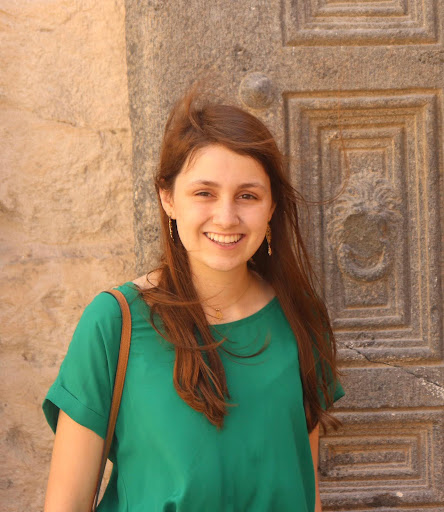
Maria Erquiaga is a senior in Mechanical Engineering and a Pre-Med student. She is the co-president of Tau Beta Pi, an undergraduate research assistant in the Department of Mechanical Engineering, a member of The National Society of Women Engineers (SWE), and a member of the American Society of Mechanical Engineers. Over the last few years, she has made a significant impact on the School of Engineering through her leadership, research, and community-oriented mindset.
Hailing from Sarasota, Florida, Maria came to The Catholic University of America specifically to study pre-med in mechanical engineering program; finding this program unique from other more traditional pre-med programs at other universities. Maria enjoyed physics, calculus, and engineering related courses in high school, and saw this program as the perfect opportunity for her to obtain the necessary prerequisites for medical school, while also pursuing studies in a discipline she was passionate about.
A strong interest in the hard sciences was not the only determining factor in choosing mechanical engineering as her undergraduate degree. She also sees engineering as a discipline that gives one “...a completely different tool box to work with,” and one that differentiates you from people who take a more traditional pre-med track. Unlike the more traditional pre-med programs—such as biology, psychology, or chemistry—Maria believes an engineering pre-med track specifically prepares one to solve complex problems, while also receiving the necessary skills to put this knowledge into action and impose real change. She sees engineering as a field that seeks “to know, in order to solve” rather than one that “seeks to know for the sake of knowing.” This is why studying engineering was important to her. Furthermore, she sees the mission of engineering and medicine as fundamentally aligned, sharing a common methodology; formulated to identify an issue, find solutions, and solve the problem.
The theme of “taking action” and working with others to solve problems was quite evident in how she described her experience at Catholic University. Maria said the School of Engineering fosters an environment that welcomes participation and collaboration between students, and faculty. She described the school as just small enough to run into familiar faces, where students and faculty know each other, and a sense of community is realized. According to Maria, this community-oriented environment is representative in part by the “presence of mind” demonstrated by each professor, where faculty focus considerable attention to the interests and needs of their students.
This environment excites students, helps to develop them into more comfortable and thoughtful contributors, and inspires them to participate and to do more; like working with faculty as a research assistant, representing student interest through student-led clubs and organizations, or participating in a collegiate sport. It is the sense of community in this school which enables students to explore newfound interests—both within their academic discipline and outside—helping to establish new skills and passions; teaching them about who they are as a person, and what they ultimately want to do with their career and life.
This individualized approach to teaching, and the community that it facilitates and further reinforces, is not widely seen at larger engineering schools, yet is present here at Catholic University’s School of Engineering.
As a co-president for the Tau Beta Pi chapter, Maria took on the unique challenge of rebuilding a student organization that saw a significant decrease in enrollment and membership due to the Covid-19 pandemic. Upon her installment as co-president, Maria’s goals were to rebuild the membership and rekindle resources, in order to restore the impact and legacy the organization has historically had. Since taking over as co-president, she has increased the membership significantly, and begun the process of gathering donations through networking and outreach, in order to help fund the services and initiatives the organization typically provides to the School of Engineering. Giving back to the community and developing the next generation of engineering leaders is one of Maria’s goals, and one that she takes great pride in. Just as she sees engineering and medicine as fields that seek to know in order to solve, she sees her leadership and the purpose of this organization as a means to address shortcomings, in order to promote positive change and influence on the School of Engineering, the university, and the community as a whole.
Maria plans to apply to medical school this year, hoping to start next fall. She is sad to leave the School of Engineering and Catholic University next spring, but excited and well prepared for what lies ahead. She is proud of the work she has done here, and will take the skills she has learned and developed with her as she solves new problems and imparts greater change in the years to come.
